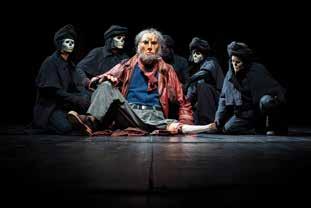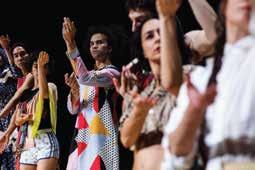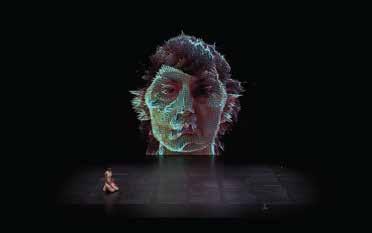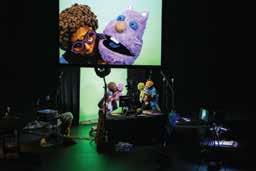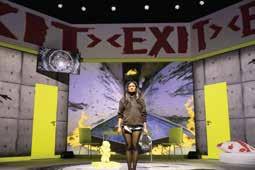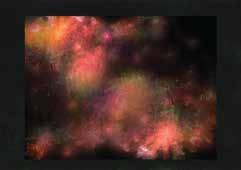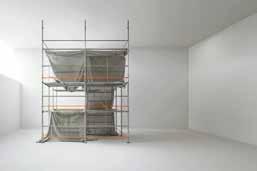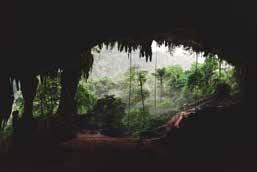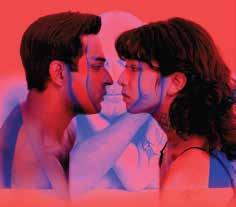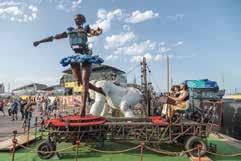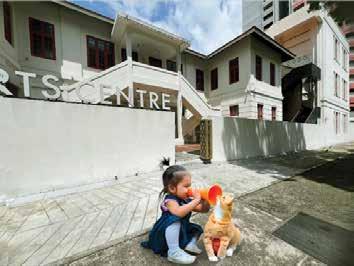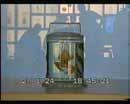24 – 26 MAY


24 – 26 MAY

Leonardo is a terrible monster! He tries so hard to be scary, but he just… isn’t.
Then Leonardo finds Sam, the most scaredy-cat kid in the world. Will Leonardo finally get to scare the tuna salad out of someone? Or will it be the start of an unlikely friendship?
Leonardo! A Wonderful Show About a Terrible Monster uses hundreds of illustrated paper puppets, book pages, two-dimensional props, furry monster puppets, and songs to bring Mo Willems’ books to life. This performance re-creates the experience of holding one of Mo’s book pages, which are big, bold, colorful, and full of visual rhythm, with a playful use of scale.
Like all Manual Cinema productions, you’re invited to watch the big screen like a traditional movie, or to watch the artists below as they create the story in real time. (There is no wrong way to watch the show!)
This kit is designed for deeper engagement and discussion with the SIFA programme. For younger audience members, this kit is communicated through the educators and parents’ perspectives. Divided into 4 sections, it comes with guiding questions, suggested activities and links for further exploration on the subject and themes presented in the show:
Before The Show
Pre-show preparation to understand the context
During The Show Questions to think about while watching the show
After The Show A reflective exercise to jot down thoughts
Post-show Activity
For further exploration on the subject, topic or themes
Leonardo! A Wonderful Show About A Terrible Monster explores the characters and themes adapted from Mo Willems’ books featuring monsters to develop an understanding of empathy and friendship. These pre-activities engage the children to be immersed in the world of monsters.
Draw a picture of what you think a monster would look like. You may use the eyes of the monster, drawn below, to guide you.
Do you think your monster is scary?
What about of the appearance of your monster that you think might be scary?
What are some of the things that scare you?
Look at the pictures below. You may colour the pictures that scare you, or you may draw in other scary things in the empty box below.
What would you do if you were to encounter any of these scary things above?
If you are feeling scared, where would you hide in your house? Look around your house and draw a picture of yourself in the space you would hide in below:
Describe this space and explain why you have chosen to hide there.
Encourage your children to read or flip through Mo Willems’ book Leonardo, the Terrible Monster before attending the show. Discuss the characters, the story, and what they think might happen in the performance.
Select key scenes from the book and act them out together. Let children take on the roles of Leonardo, Sam, and other characters. This can help them familiarize themselves with the story and characters.
WHAT makes someone a “terrible” monster? Do monsters always have to be scary?
HOW do you think Leonardo feels about being a monster? Why do you think he wants to scare someone?
HAVE you ever felt like Leonardo? When and why?
Before the performance starts, remember to pay close attention while you are engaging in the performance, so you do not miss out on any details:
1 the performers tell the story. What do you notice? Observe the way
2 that you see in the show (including paper, shadow, sock, rock, and live hand puppets) Identify the types of puppets
4 of the terrible monsters used in the show. List some of the descriptions
3 are used to create different characters and scenes. Describe how the puppets and shadows
5 with the screen projection. What do you notice and observe? Examine the live camera and perspective work
6 to the music and sound effects. How do they enhance the mood of the story? Pay attention
7 What was Leonardo’s big decision?
For educators and parents in active engagement, you may...
Encourage children to make connections between what they see on stage and what they have read in the book.
Have them whisper to you their reactions to different moments in the show.
Invite them to mimic the movements of the performers or the puppets.
Write down what you have noticed to answer the questions above, or a simple reflection of your thoughts about the performance:
(A)
What was your favourite part of the show? Why?
(B)
How did the performance compare to the book? Were there any differences?
(C) Did your feelings about Leonardo change throughout the story? Why or why not?
LEONARDO: SAM:
What are some things that make Leonardo different from the other monsters?
Why do you think Sam is called the most ‘scaredy-cat kid in the whole world’?
How do you think Leonardo feels when he can’t scare anyone?
How do you think Sam feels when he gets scared?
Why do you think Leonardo chooses Sam to be his friend?
How does Sam’s fear affect his everyday life?
How does Leonardo change throughout the story?
What are some ways that Sam overcomes his fears in the story?
What do you think makes a good friend?
Can you think of a time when you felt like Leonardo or Sam? What made you feel that way?
Do you think it’s okay to be scared sometimes? Why or why not?
Do you think it is important for everyone to be the same? Why or why not?
Can you think of a time when a friend helped you feel less scared?
A) Draw and write a description of your own “terrible” monster and what makes them special or different.
B) Compare this “terrible” monster to the one that you have drawn earlier. Describe in a few words how this “terrible” monster is different, or similar.
C) Create a new adventure for Leonardo and imagine what happens if he were to encounter your “terrible” monster above. You may use the storyboard below:
Title:
Share your storyboard with your friends and exchange your different “terrible” monster adventures!
Imagine you are writing a letter to one of the characters in Leonardo! A Wonderful Show About A Terrible Monster. What would you say to the character?


Encourage children to think about what they would say to the character and how they might offer friendship and support.
Allow children time to write their letters, emphasizing empathy and kindness in their messages.
Leonardo! A Wonderful Show About A Terrible Monster uses a lot of cinematic techniques to create the magic of the show. One of the techniques used by Manual Cinema is forced perspectives, a trick used by artists and photographers to make objects look different sizes or distances by arranging objects or people in a certain way. This can make something small look big, or something far away seem much closer.
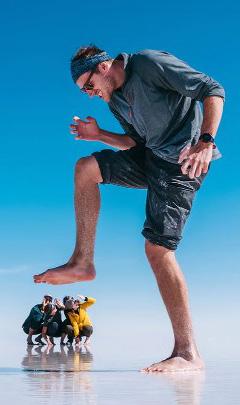
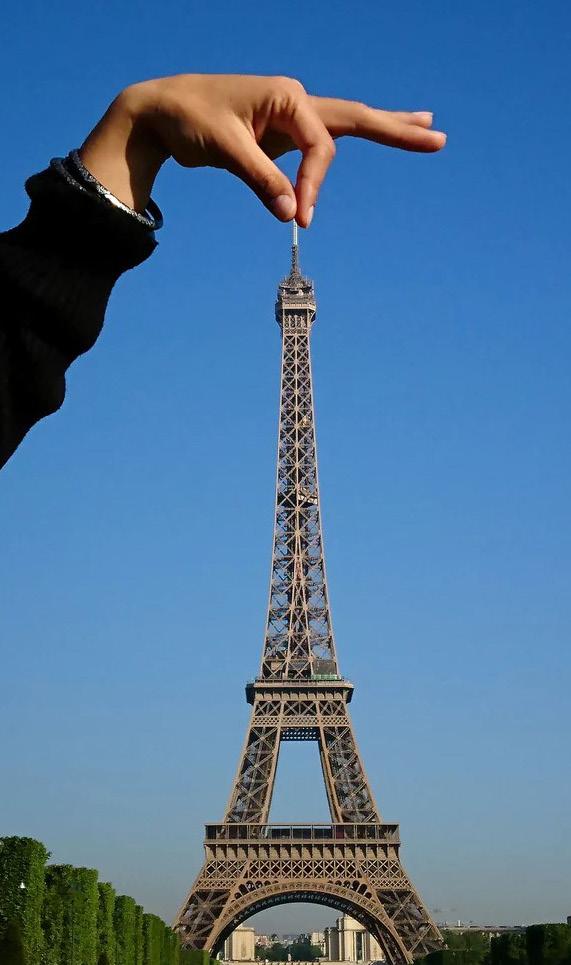
To help spark your imagination you can watch this video:
Can you guess how each of the pictures were made?
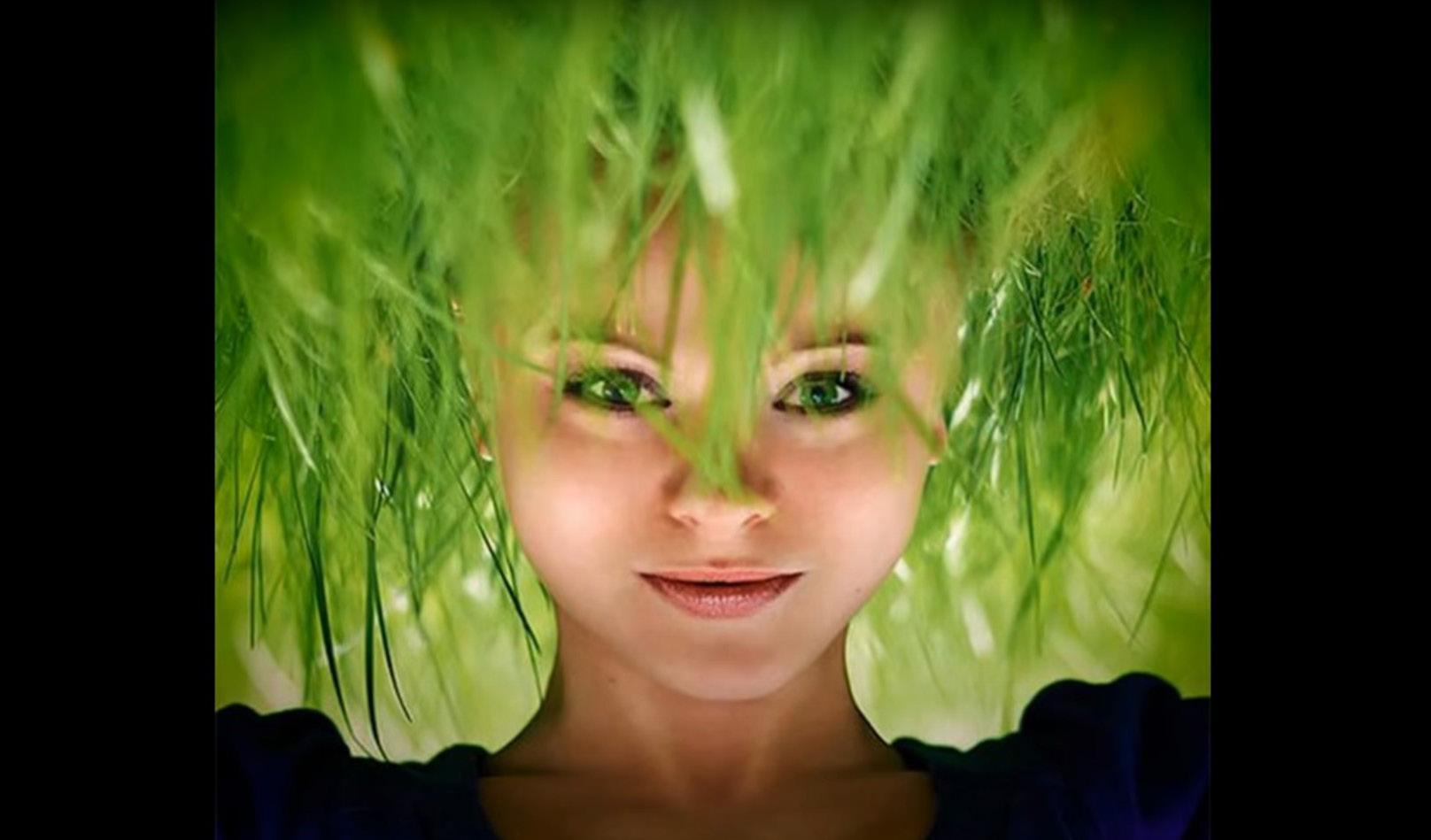
Play some fun music and have a dance party where children can pretend to be monsters. Encourage them to move creatively and expressively.
Provide materials for children to create their own shadow puppets and stage a mini performance. They can use their imagination to tell their own stories or recreate scenes from “Leonardo, the Terrible Monster.”
The art of making films or the study of the cinema
A problem that is difficult to deal with
Something that is not really what it seems to be
Done or operated with the hands
A particular way of considering something
Very bad at doing something
The ability to share someone else’s feelings or experiences by imagining what it would be like to be in that person’s situation
Relating to light or the ability to see
Trusting; not realizing there is any danger or harm
Extremely good
Click or Scan here All About Mo Willems, Britannica Kids Click or Scan here Manual Cinema
Click or Scan here Lunch Doodles with Mo Willems! By The Kennedy Center
Click or Scan here Leonardo the Terrible Monster, read aloud
Click or Scan here
Sam, the Most Scaredy-Cat Kid in the Whole World, read aloud
Click or Scan here
“Forced Perspective – Everything You Need to Know,” Nashville Film Institute
As Singapore’s annual pinnacle performing arts festival, the Singapore International Festival of Arts (SIFA) presents captivating and diverse works across theatre, music, dance, film and visual arts. First launched as the Singapore Festival of Arts in 1977, the festival has gone through several evolutions and inspired generations of arts lovers and practitioners.
Under the helm of Festival Director Natalie Hennedige from 2022 to 2024, SIFA will focus on performance and creation in the physical and online space, around the theme The Anatomy of Performance.
Today, the highly anticipated festival is a high point on Singapore’s arts and cultural calendar. SIFA continues its festival mission to champion the creation and presentation of Singaporean and international works.
We can’t wait to welcome you at SIFA. Share with the world (and us!) what you are most excited to see at this year’s festival, or your photos and videos of your favourite SIFA festival moment.






House Limited (AHL)
Arts House Limited (AHL) is a not-for-profit organisation dedicated to inspiring and enriching lives through the transformative power of the arts.
We proudly organise two flagship national festivals: the Singapore International Festival of Arts, a celebration of the local and international performing arts, and the Singapore Writers Festival, a multilingual festival presenting the world’s leading literary talents.
At the heart of AHL’s mission are six arts spaces designed to support our vibrant arts sector and forge connections within communities. It includes two national monuments—The Arts House, multidisciplinary arts centre, and Victoria Theatre & Victoria Concert Hall, a heritage building that is home to the Singapore Symphony Orchestra.
AHL also runs the Drama Centre, a dedicated performing arts space, as well as three creative enclaves for arts groups and innovative enterprises: the Goodman Arts Centre, Aliwal Arts Centre, and Stamford Arts Centre.
Established in 2002 as The Old Parliament House Limited, AHL transitioned to its current identity as Arts House Limited in 2014. As a public company limited by guarantee under the National Arts Council, we remain steadfast in our mission to champion the arts as a powerful force for positive change.
For more information, visit https://artshouselimited.sg/.
Engage your students in the arts at SIFA with our special deals for schools.
SIFA offers 15%* off ticket purchases to local and international students. *Applicable to selected ticket categories and Programmes
For selected programmes, government schools may enjoy subsidies up to 50% of the ticket price. Applicable for Secondary Schools, Junior Colleges, Centralised Institute and Institute of Technical Education (ITE) levels.
Special Education Schools may use the Tote Board Arts Grant to subsidise up to 70% of the programme cost. For more details on school bookings or Tote Board Arts Grant, please email sifatickets@artshouse.sg
For every 20 students tickets purchased, 1x complimentary ticket provided for the teacher.
For further enquiries on programmes or education kits, please contact meganlee@artshouse.sg
For group bookings, please contact sifatickets@artshouse.sg.
To read more about the Tote Board Arts Grant, visit https://tinyurl.com/Tote-Board-Arts-Grant
For more information on the festival, visit sifa.sg



